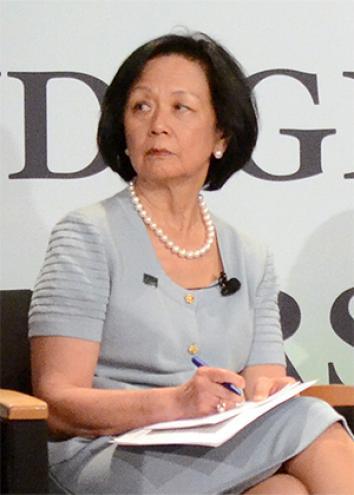This article originally appeared in Inside Higher Ed.
Students (and plenty of professors) love snow days. But when they can’t get what they want, is that any reason for a blizzard of hate on Twitter?
That is among the questions raised by the reaction at the University of Illinois at Urbana-Champaign when Phyllis M. Wise, the chancellor, opted to keep classes as scheduled Monday, despite extremely cold weather. That some students would take to Twitter to gripe is not shocking. But a flurry of comments focused either on Wise’s status as a woman, as an Asian-American, or both. The hashtag of choice: #fuckphyllis.
Among the tweets (skipping the most offensive) using the hashtag: “In room with Phyllis Wise, Adolf Hitler and a gun with one bullet. Who do I shoot.” Many tweets played off Wise’s race. “Communist China no stop by cold,” for example.
Or “Asians and women aren’t responsible for their actions,” or “Phyllis Wise is the Kim Jong Un of chancellors.” Many others referenced the female anatomy, or used additional hashtags, such as a vulgar four-letter word for a part of a woman’s anatomy. At least two Twitter accounts pretending to be Wise’s were created and proceeded to mock her, although they were promptly removed by Twitter.
As the day went on, many others (also using the main hashtag to critique Wise) started to express anger and embarrassment that some at the university would respond to Wise’s decision in offensive ways.
Wise, a spokeswoman said, quickly became aware of the debate not because she follows Twitter but because so many people sent her email to offer support. Someone sent a bouquet to her office. She went about her normal business for the day, and didn’t comment. A spokeswoman said that the campus judicial officer looked at the tweets and determined they were protected free expression, and so no attempt is planned to punish those who tweeted.
But even if Wise isn’t speaking out, many others are. What does it mean that an Asian-American woman would be criticized in this way? Blog posts and some other commentary in Illinois noted that this is the same university where some alumni made harsh attacks on officials who wanted to retire a Native American mascot—something that eventually happened but much too late to satisfy many minority students and Native American activists. One blog post talked about “a culture of complacency” in which wealthy, white students (or some of them) feel entitled to take down those with whom they disagree.
Bjong Wolf Yeigh, chancellor of the University of Washington at Bothell and one of the very small number of Asian-American chancellors and presidents, noted that the decision to keep a college or school open can unleash anger—including against white men. He recalled numerous angry comments on Twitter this month when the superintendent of schools in one of the suburbs of Washington, D.C., kept the schools open. Local press accounts said that the official was being “cyberbullied.”
But Yeigh also said it was sad to read the tweets about Wise, comments made out of “bigotry and ignorance.” He said he could not help but wonder “if this type of attack would happen so readily if there were more Asian-American presidents and if there were organizations and groups that support Asian leaders and won’t tolerate this kind of behavior.”
Judith White, president of HERS (Higher Education Resource Services, which runs programs for female executives in higher education), said she found the Twitter comments “disappointing, disheartening, but not as surprising as I wish.”
She said that, for many people, comments denigrating people based on gender or race “are not too far below the surface when people get angry.” She said she advises women who are presidents or would-be presidents that “you have to get ready for this,” because events that have nothing to do with gender will get discussed with a focus on gender. “You hope it’s not going to be you to have this happen, but you do have to be ready.”
Rosalind Chou, assistant professor of sociology at Georgia State University and co-author of The Myth of the Model Minority: Asian Americans Facing Racism, said she didn’t think a white male chancellor would have faced the same backlash. “If there were a white male chancellor, certainly the texts with the violent sexualized tones would have been absent or presented in a different manner,” Chou said. “Also the images of a cold, heartless ‘dragon lady’ emerge from stereotypes specifically about Asian and Asian-American women. So, no, I don’t think a white male chancellor would have faced these types of attacks.”
Joe Gow may demonstrate Chou’s point. He’s chancellor of the University of Wisconsin–La Crosse and he is among the chancellors in the frozen Midwest who, like Chou, didn’t declare a snow day. Some students took to social media, but they did it with humor. He said he found the attacks on Wise “shocking.” Because his students handled the cold day in a very different way, he was able to forward his favorite social media image to all students:
His note: “I replied to the student who sent the image to me that at my age it might be more appropriate to draw physical comparisons with Yoda, Obi-Wan or, on a good day, Han Solo. But I’m flattered to be out there as Luke!”
